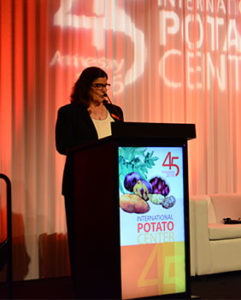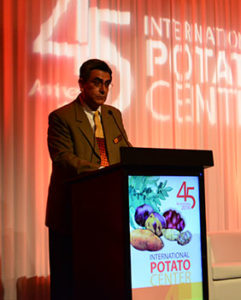Nearly half a century ago, when CIP was founded, potato collectors in remote regions of Central America traveled for “weeks on end” with dwindling tanks of gas to find new specimens, as Director General Barbara Wells put it in her remarks at CIP’s 45th anniversary celebration September 16.
“They traveled to small villages or on horseback when their four-wheeled drive vehicles could go no further to collect the thousands of varieties of tubers that now populate CIP’s genebank,” she said. “They used local knowledge and their years of experience to gather these treasures of the Incas. One researcher was known to travel on a remote stretch of road when he would tell the driver to stop because he could smell the potatoes. Apparently he was correct in nine out of 10 times.”

CIP’s first Director General Dr. Richard Sawyer envisioned a regional research and collaboration with researchers around the world to develop new technologies and innovations to improve food security. “He probably never dreamt that one day farmers in the high Andes, the rainforests of Sub-Saharan Africa or the upper Ganges in India would be connected to the world by smart phones or researchers would video conference into scientific meetings,” Wells said. “He may not have dreamt that sweetpotato would someday become one of CIP’s mandate crops nor would he have thought a CIP scientist, much less three of them would win the World Food Prize for their work on it.”
Reflecting back over four and a half decades since CIP’s inception, Wells and other notables had much to celebrate, even as they acknowledged the relatively brief span of time CIP has been in existence compared to the long history of potato itself.
Some “8000 years ago, potato domestication began in the Andes and potatoes have been cultivated and thrived there for the subsequent thousands of years, thanks to the work of farmer scientists, who then, as they are now, the true potato guardians or potato arariwas,” said Oscar Ortiz, CIP’s deputy director for research.
“While the ‘papa Arariwa’ has tended to be our namesake tuber for thousands of years, CIP has had but 45 years of history in potato’s center of biodiversity. Still these 45 years of uninterrupted and very productive research has been for the benefit of Peru, Latin America and the entire world.”

From an early focus on conserving genetic resources to ongoing breeding efforts, CIP has remained at the forefront of research, says Ortiz.
“Our work has put potato and sweetpotato, in particular, as key crops to face the current challenges established in the [UN’s] Millennium Development Goals and further expanded up by the Sustainable Development Goals,” he said. “We firmly believe that potato and sweetpotato are crops that can reduce poverty and malnutrition, increase income, increase food security, support sustainable intensification and diversification of food systems and promote adaptation to climate change.”
Keynote speaker and sweetpotato advocate Nane Annan noted another critical CIP accomplishment of 2016: being awarded the World Food Prize (WFP). Three CIP scientists – Maria Andrade, Jan Low and Robert Mwanga – were named WFP Laureates. “I am certain that the recognition by the World Food Prize Foundation of the benefits of OFSP for food and nutrition security will help extend its reach into the regions where it is most needed,” she said.
“Malnutrition, as we know, remains a serious barrier to development, particularly in rural areas in Africa,” she went on to say. “It is denying children, communities and nations from reaching their full potential.”
Annan became an unofficial OFSP ambassador several years ago, after learning more about the crop’s health benefits. “I learned… how it can help the most vulnerable of all – pregnant women, new mothers and children,” she said. “I learned that it can grow in poor soils, produce good yields in a short growing period – even under changing weather patterns – and improve revenues along the value chain.”
Much work lies ahead, warned CIP’s Ortiz, such as figuring out “how to feed a growing population with shrinking resources – less land, less water – and under the threats of climate change that places greater responsibility on the shoulders of agricultural research organizations like [ours].”
“We could not have survived all of these 45 years without you and countless farmers and communities are counting on us to work together to improve their food security and nutrition,” he concluded.
Across the world and throughout the year, CIP will be celebrating key events in our history and sharing news about the work ahead. Be sure to follow us on Twitter, Like our Facebook page and visit www.cipotato.org regularly to keep abreast of it all.
